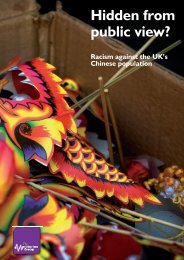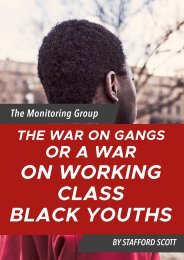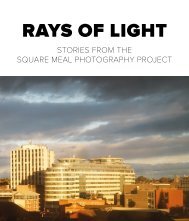Coming of Age : 1976 and the Road to Anti-Racism
Coming of Age : 1976 and the Road to Anti-Racism by Jagdish Patel and Suresh Grover
Coming of Age : 1976 and the Road to Anti-Racism
by Jagdish Patel and Suresh Grover
You also want an ePaper? Increase the reach of your titles
YUMPU automatically turns print PDFs into web optimized ePapers that Google loves.
Bourke cited detailed studies <strong>of</strong> <strong>the</strong> psychological impact <strong>of</strong> <strong>the</strong> Vietnam War on veterans<br />
which found no relationship (or even a negative relationship) between violent crime rates <strong>and</strong> military<br />
participation. Bourke’s study <strong>of</strong> twentieth-century ex-combatant letters <strong>and</strong> diaries found<br />
that veterans were not ‘numbed’ by killing, even when distanced from <strong>the</strong> enemy by technological<br />
development; on <strong>the</strong> contrary, … combatants <strong>the</strong>mselves consistently raised issues <strong>of</strong> personal<br />
responsibility. 9 While this point is well made, it is important <strong>to</strong> remember that while ex-service<br />
personnel may not have been brutalized by war, <strong>the</strong>ir experiences <strong>and</strong> years <strong>of</strong> service left many<br />
disillusioned <strong>and</strong> prepared <strong>to</strong> organise <strong>and</strong> protest in large numbers against <strong>the</strong>ir peacetime lot.<br />
General demonstrations <strong>of</strong> post-war resentment across many sections <strong>of</strong> British society<br />
were in <strong>the</strong> large seaports specifically focused on <strong>the</strong> twin issues <strong>of</strong> job <strong>and</strong> housing shortages.<br />
National Identity, <strong>the</strong> Imperial <strong>Age</strong>nda <strong>and</strong> a ‘black Atlantic’ perspective<br />
The seaport riots <strong>and</strong> <strong>the</strong>ir aftermath posed a challenge <strong>to</strong> <strong>the</strong> nature <strong>of</strong> Britain’s imperial rule<br />
<strong>and</strong> raised questions about <strong>the</strong> identity <strong>and</strong> status <strong>of</strong> colonial peoples both within <strong>the</strong> metropole<br />
<strong>and</strong> in <strong>the</strong> colonies. Divergent interpretations <strong>of</strong> national identity emerged from metropolitan<br />
<strong>and</strong> colonial opinion during <strong>the</strong> 1919 riots. ‘Britishers first’ was <strong>the</strong> overriding sentiment during<br />
disorder in <strong>the</strong> ports, particularly when rioting broke out when sailors confronted each o<strong>the</strong>r<br />
directly in <strong>the</strong> hiring yards <strong>of</strong> merchant marine shipping <strong>of</strong>fices. However, those on opposing<br />
sides during <strong>the</strong> riots held different opinions <strong>of</strong> what was meant by being British. An article in <strong>the</strong><br />
Times written at <strong>the</strong> height <strong>of</strong> <strong>the</strong> rioting poked fun at <strong>the</strong> allegiance black Bri<strong>to</strong>n felt <strong>to</strong>wards<br />
<strong>the</strong> Empire. “The negro [sic] is almost pa<strong>the</strong>tically loyal <strong>to</strong> <strong>the</strong> British Empire <strong>and</strong> he is always<br />
proud <strong>to</strong> proclaim himself a Bri<strong>to</strong>n. 10 The seaport riots highlighted contested meanings <strong>of</strong><br />
national identity: black British sailors protested about <strong>the</strong> employment <strong>of</strong> foreign white sailors;<br />
white sailors (including foreign-born) campaigned <strong>and</strong> rioted against <strong>the</strong> employment <strong>of</strong> black<br />
African, African-Caribbean, Arab, Chinese, <strong>and</strong> South Asian sailors, many <strong>of</strong> whom were British.<br />
The broad concept <strong>of</strong> British identity can be summed up in <strong>the</strong> phrase “civis Britannicus<br />
sum. This notion was derived from <strong>the</strong> Latin phrase “civis Romanus sum. Not everyone<br />
in <strong>the</strong> Roman Empire held citizenship: it was a privilege enjoyed only by a few (<strong>and</strong> could<br />
be inherited, merited, or won after long service). Many Roman citizens lived hundreds<br />
<strong>of</strong> miles from <strong>the</strong> city but still claimed <strong>the</strong> privileges <strong>of</strong> <strong>the</strong>ir status. In <strong>the</strong> British Empire,<br />
<strong>the</strong> phrase came <strong>to</strong> denote <strong>the</strong> rights <strong>and</strong> residence privileges <strong>of</strong> all British subjects under<br />
<strong>the</strong> British crown no matter where <strong>the</strong>y lived. The rights given <strong>to</strong> British subjects were<br />
built on <strong>the</strong> confidence <strong>and</strong> feeling that subject status was an honour bes<strong>to</strong>wed by British<br />
rule, it allowed any British subject right <strong>of</strong> entry in<strong>to</strong> Britain. This status was reinforced<br />
in law in 1914 in <strong>the</strong> British Nationality <strong>and</strong> Status <strong>of</strong> Aliens Act which stated: “Any person<br />
born within His Majesty’s Dominions <strong>and</strong> allegiance [is] …a natural born British subject. 11<br />
22 | <strong>Coming</strong> <strong>of</strong> <strong>Age</strong><br />
<strong>Coming</strong> <strong>of</strong> <strong>Age</strong> Final version 16.10.indd 22 17/10/2017 12:06







